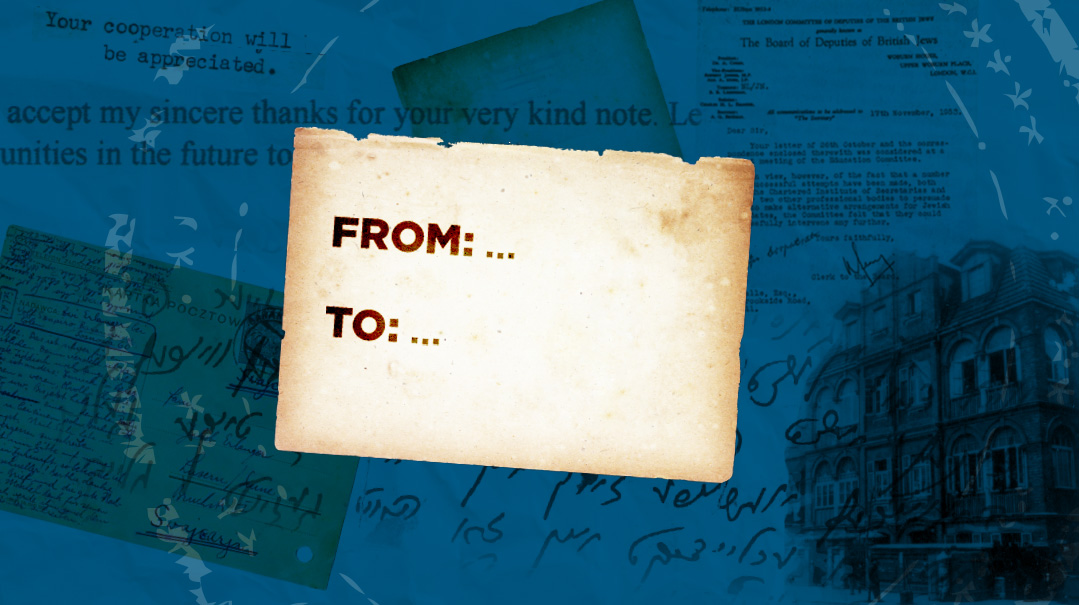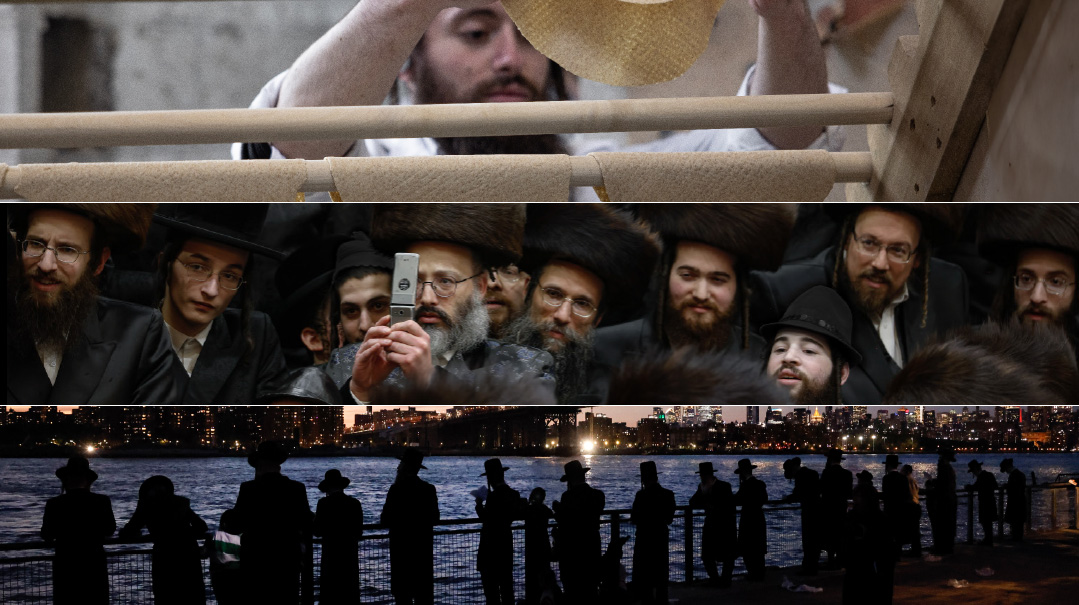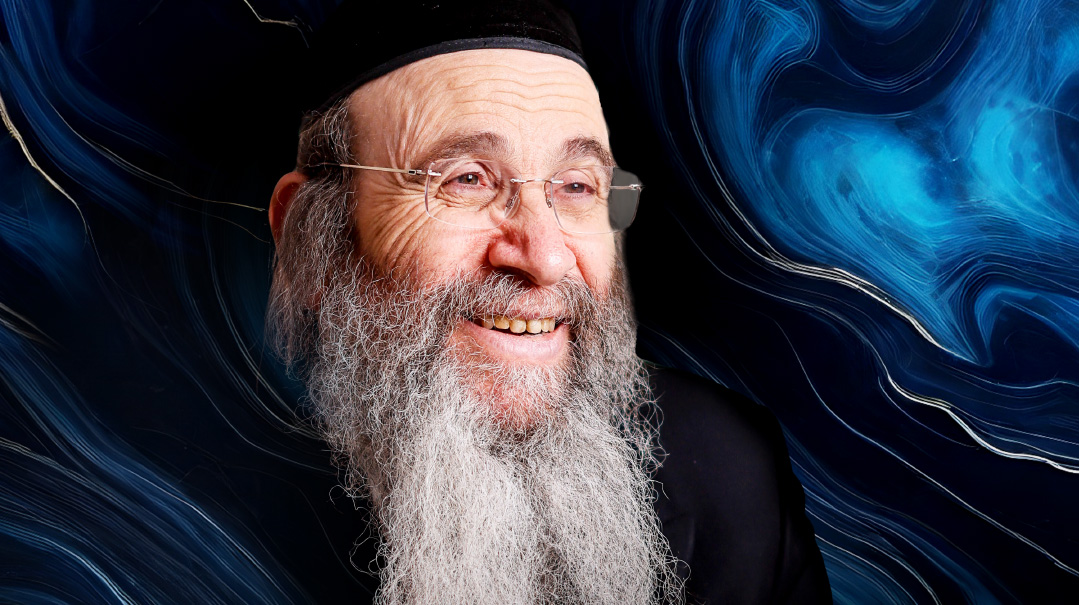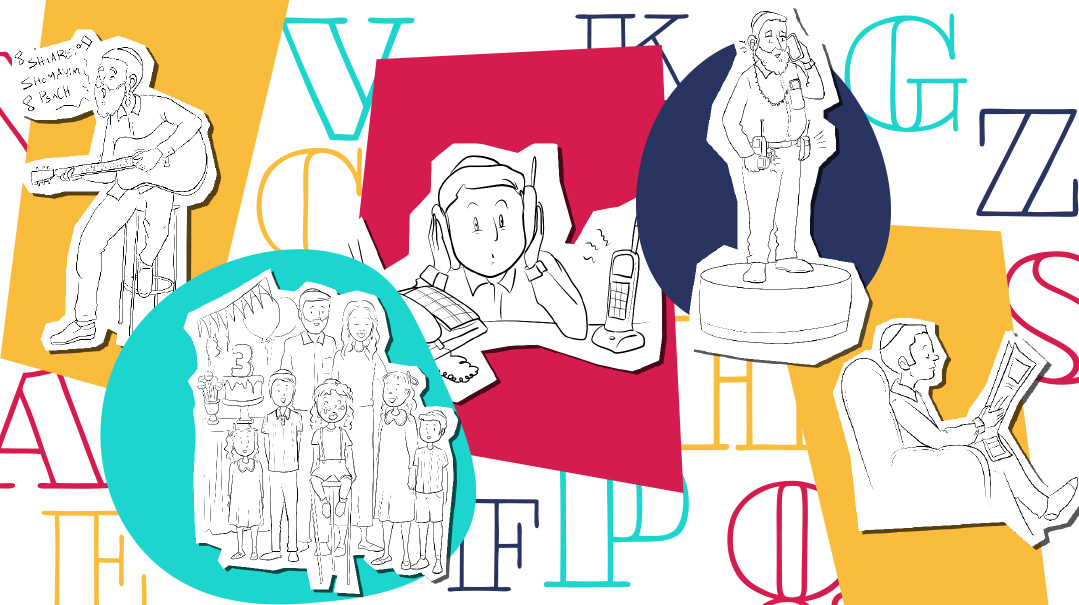Child of My Prayers

88-year-old Rav Tzvi Kushelevsky brings his own bechor Into Avraham Avinu’s covenant
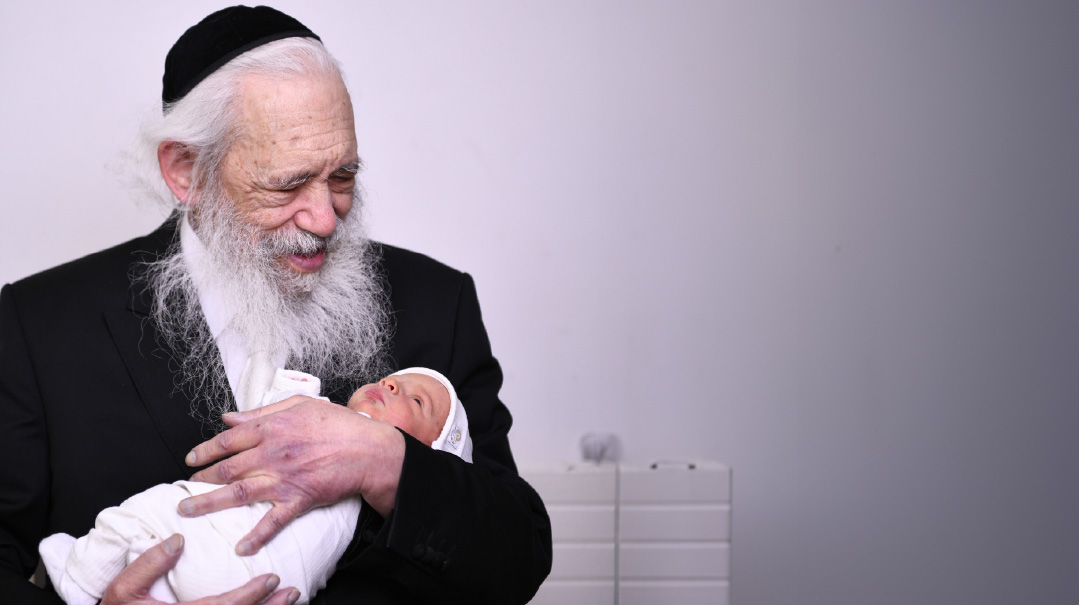
It was surely the story of the week in the Jewish newsfeeds: In a modern-day Avraham Avinu-like miracle, 88-year-old Rav Tzvi Kushelevsky, rosh yeshivah of Heichal HaTorah in Jerusalem, had his first child. While Rav Tzvi could have sufficed with saying, “My students are my children,” he insisted on a child of his own with unswerving faith in the knowledge that nothing is beyond HaKadosh Baruch Hu’s reach
W
hen dancing broke out in the streets of Jerusalem’s Har Nof neighborhood outside Rav Tzvi Kushelevsky’s yeshivah last week, it didn’t take long for the extraordinary news to spread around the world: The Rosh Yeshivah, at the age of 88, was celebrating the birth of his firstborn son.
Reminiscent of then 99-year-old Avraham Avinu when the angel told him he’d have a line of continuity through his wife Sarah, the joy in Yeshivas Heichal HaTorah after the standing-room only bris this past Sunday is still overflowing. And amid the tumult sits the beaming Rosh Yeshivah, who last week was on the receiving end of an open miracle, his legions of spiritual sons finally joined by a biological one. He’s endlessly elated — but not really surprised.
“Hashem’s ‘miracle bank’ is infinite,” Rav Tzvi declares as we sit in his private apartment in the yeshivah building. “There is no yiush, no despair in the world at all! We say on Purim, ‘Lehodia shekol kovecha lo yeivoshu lo yikalmu lanetzach kol hachosim Bach — to make known that all who place hope in You shall not be put to shame, nor shall all those who put their trust in you be disgraced…’ ”
Over the last week, the entire Jewish world and beyond has been talking about Rav Tzvi Kushelevsky’s miracle — the birth of a baby boy to his second wife whom he married six years ago as a widower, after he and his first wife of over half a century remained childless. But all the hype is just fine with him. He’s happy to publicly thank Hashem for this most precious and unusual gift, to be mekadesh Sheim Shamayim and to strengthen others who are coping with challenges and difficulties and mostly, waiting many long years for children of their own.
“If we believe that HaKadosh Baruch Hu doesn’t give a person a challenge that he cannot withstand, it gives us strength to grasp onto our emunah and not give up,” the Rosh Yeshivah says. “What helped me personally during all these years was the thought that HaKadosh Baruch Hu surely wants me to succeed, and surely wants me to have a yeshuah.”
It’s a little hard to grasp the depth of the words, and furthermore, how does someone facing similar challenges continue to hope and not give up? People who’ve waited a long time for a yeshuah generally reach a point where they realize it’s time to back down and submit to the Will of Hashem. When is it appropriate to continue to plead, and when is it time to come to terms with reality?
“There is no such thing as stopping to daven,” the Rosh Yeshivah declares firmly, and it soon becomes a little clearer why the Rosh Yeshivah has merited what almost no one else in the world has.
“A person does not need to reach a state where he is in despair of salvation and comes to terms with the situation as a sealed decree. One must always daven, not in his own merit, but out of the recognition of the compassion and love that HaKadosh Baruch Hu has for us. A Jew needs to stand in front of Hashem and say: ‘Ribbono shel Olam, I know that there is no One but You, no other power in the world. I know that You are only real goodness and the real Master of compassion. If so, surely and without a doubt You will give me a yeshuah.’ And if we really and truly believe that,” the new father states, “the yeshuah will happen.”
Words from a different time, for a different generation. Even his closest talmidim were awed into silence, especially after what Rav Kushelevsky said next:
“I had a Divine revelation. My father ztz”l came to me in a dream and told me that the Ari Hakadosh will soon be coming to me in a dream and will promise me a great yeshuah. And in preparation for this dream, my father pleaded with me to believe what the Ari Hakadosh was going to say. Indeed, that’s what happened. I heard the good news from them both. Although everyone has dreams, I knew that this dream was true. Real dreams don’t come randomly — and when they come after Torah study, we merit an additional level of revelation. That’s because Torah illuminates the eyes and makes it possible to have a different view on challenges in life. The Torah gives us the ability to get the strength to withstand all that is happening to us. And we have to remember to never stop believing for a minute, and to contemplate constantly on what Hashem wants from us in any situation.
“For the klal, Hashem wants to bring the Geulah, but He wants our help,” Rav Tzvi continues. “So how do we bring the Geulah, and how can we draw down yeshuos for Klal Yisrael and for each individual? In the end, everything depends on our kavanah. It will happen if we serve Hashem not to receive reward in This World and in Olam Haba, and not even to merit to have a high place in Gan Eden, but rather for one purpose: to bring nachas ruach to Hashem. When we internalize this deep in our hearts, when the goal is purely l’Sheim Shamayim, there are yeshuos.”
To Change Reality
Rav Tzvi Kushelevsky was born in Eretz Yisrael in 1936. His father, Rav Eliyahu Kushelevsky — a brother of Gateshead rosh yeshivah Rav Leib Gurwicz (Kushelevsky) — had moved to Eretz Yisrael the previous year and married, but the family emigrated to the US three years later when Rav Eliyahu was offered a rabbinical position in New Jersey and helped found Yeshivas Radin/Chofetz Chaim in New York.
Rav Tzvi learned in Radin in America, and later under his uncle in Gateshead, England. When his parents returned to Israel in 1953 — Rav Eliyahu was one of the founders of Boys Town in Jerusalem and then became chief rabbi and av beis din of Be’er Sheva — Rav Tzvi returned as well, studied in Yeshivas Chevron, became a talmid of the Brisker Rav, and married his first cousin Sarah Leah, Rav Leib Gurwicz’s daughter.
In the 1960s, Rav Tzvi became a rosh kollel in Manchester, later moved to France to take a position in the yeshivah in Aix-les-Bain, and then returned to Eretz Yisrael in 1971, founded a yeshivah in Be’er Sheva, became rosh yeshivah in ITRI-Hadera, moved with some talmidim to Torah Ore in Jerusalem when Rav Chaim Pinchas Scheinberg wanted to open a section of the American yeshivah for Israeli bochurim, and finally established his own yeshivah, Heichal HaTorah, which began in Jerusalem’s Geula neighborhood, moved to Givat Shaul, and finally found a permanent home in Har Nof.
Over the years, the Rosh Yeshivah has nurtured thousands of talmidim, many of them from outside Eretz Yisrael; today, a lot of those alumni serve as roshei yeshivah and Torah educators throughout the Jewish world. Rav Kushelevsky has published his series Simchas Tzvi and Toras Tzvi on most masechtos in Shas, as well as Shaarei Binah on hilchos Shabbos, Shaarei Tefillah on prayer, and several other works.
Rebbetzin Sarah Leah passed away in 2015 at age 77. The couple had no children. Three years later, Rav Kushelevsky married his second wife, Mrs. Rochel Rivka Daniella from the United States, who was 50 years old at the time and the mother of seven children of her own.
At the time, Rav Kushelevsky consulted with Rav Moshe Sternbuch on the shidduch and after it was finalized, asked him to be the mesader kiddushin. Immediately after the wedding ceremony, Rav Sternbuch told the Rosh Yeshivah, “You’ll be zocheh to have zera shel kayama from this zivug.” At the time, Rav Kushelevsky was 82.
Rav Kushelevsky didn’t take the brachah lightly. Since his second marriage, he signed his seforim with a tefillah that he merit progeny.
More recently, Rav Sternbuch added another brachah: “You’ll be zocheh to a ben zachar.”
After the Rosh Yeshivah left the hospital following the birth of his bechor on 30 Adar I, his first stop after returning to the yeshivah from the hospital — where he was met by heartful dancing then davened Rosh Chodesh Mussaf — was Rav Sternbuch’s home, to thank him for the brachah.
“I don’t know if my brachah helped,” Rav Sternbuch told him, “but the main point is to thank Hashem. By Yidden, the goal isn’t the miracle, but the recognition of Hashem’s chesed.” (When Rav Sternbuch was later asked about the power of his brachah, he answered that all the brachos including his were just a drop in the sea compared to the tefillos of Rav Tzvi himself.)
The Rosh Yeshivah then asked Rav Sternbuch for a brachah that the baby grow to be a talmid chacham. “That,” Rav Sternbuch told him, “depends on you.”
Don’t Give Up
“As his talmidim, we knew how much the Rosh Yeshivah wanted a child,” says Heichal HaTorah mashgiach Rav Yehoshua Frankenhuis. “Not for himself, but to be mekadesh Sheim Shamayim. Over the years, he left no stone unturned. He made every possible hishtadlus. He went to so many tzaddikim for brachos, he davened so many tefillos, and did so many segulos — all to merit a child.
“Many people, at some point, come to terms with the reality and give up. There is no doubt that the Rosh Yeshivah, who has built a legacy of generations of talmidim, could have sufficed with saying ‘my students are my children.’ And certainly, he does consider his talmidim to be his children, but in addition to that, he insisted on the simple meaning of the words — to merit a son of his own. And as it grew more difficult, and things seemed more unlikely, the Rosh Yeshivah actually insisted more, as if he forced Hashem’s hand.
“In recent years, whenever we came to the Rosh Yeshivah, whenever we asked for a brachah, he would turn it back to us and ask for a brachah for zera shel kayamah, and he would answer ‘amen’ with great fervency. In a place where others would have taken a step back, the Rosh Yeshivah simply became more determined.
“Today, we’re zocheh to see the open miracle, to see what happens when a person is determined to build, and never gives up.”
Rav Frankenhuis says the Rosh Yeshivah got much inspiration from the story of Chanah, mother of Shmuel Hanavi. Chanah, as we know, did not have children for many years. She davened copiously to Hashem until ultimately, she was blessed with a son — Shmuel. She went to the Beis Hamikdash and pledged that as soon as Shmuel turned two years old, she would dedicate him to Hashem and bring him to the Mishkan, where he would learn Torah under Eli, the Kohein Gadol. When the time came and Shmuel turned two, Chanah brought her precious son — born after so many years of tefillah — to the Mishkan, and he was consecrated for avodas Hashem.
“Unfortunately, things did not progress as planned. Shmuel began to learn Torah from Eli the Kohein Gadol, but one day, Eli was asked a question, and young Shmuel, who excelled tremendously in his learning, knew the answer. As Chazal say — he was moreh halachah in front of his rebbi. The punishment for doing so is death — even with teshuvah. Eli ruled that two-year-old Shmuel was to be sentenced to death,” Rav Frankenhuis explains.
“When Chanah heard about the death sentence cast upon her son — whom she had dedicated to the avodah in the Mikdash, the child she had yearned and cried and davened for over so many years — her heart snapped. She pleaded with the Kohein Gadol to have mercy on her. She had waited so many years to have children, and she implored him that her son should not die.
“Eli Hakohein listened to her and wanted to help, but his hands were tied. Instead, he promised Chanah another child who would be even greater than Shmuel. But Chanah refused. She insisted that he have mercy on Shmuel’s life, and she declared, ‘El hana’ar hazeh hisplalati,’ I davened for this child.
“Rav Shimshon Pincus once posed a powerful question: Chanah did everything l’Sheim Shamayim; her deep desire to have a child was not for her own benefit — she sent him away at two years old, solely so that his life would be in the service of Hashem. If so, why didn’t she accept Eli’s offer for another child who would be an even greater tzaddik than Shmuel? The answer is what Chanah told Eli: ‘Even if you give me a son who is greater than this son, this child has something special that no other child can replace. This was a child born after many years of davening to Hashem. This child forged a path through countless tears. This is an oisgebetener kind (a child that was pleaded for), and even a child who is on a higher level cannot replace that. Shmuel came into the world saturated by his mother’s tefillos. And that made him irreplaceable.
“Hashem often puts us in situations where we are lacking something, where we need a yeshuah. It makes us daven and cry to Hashem. Surely Hashem wants our tefillos, and that we should become closer to him, but this parshah of Chanah and Shmuel reveals something more.
“When a young couple has their first child within a year, the joy and gratitude to Hashem is tremendous. But if it doesn’t happen, and five years pass without a child on the horizon, they pour out their hearts in tefillah to Hashem every day. They go to the Kosel and kivrei tzaddikim to daven. If, at the end, after many years, they are blessed with a child, this child is much more precious — it’s a ‘child of tefillah.’
“If a person constantly davens to Hashem to give him his needs, they all become spiritual. His clothes, food, home, and all his physical needs become holy, served from the Table of Hashem. His very bread becomes ‘bread of tefillah.’
“Sometimes we endure hard times. It obligates us to daven and cry to Hashem like we’ve never cried before. We simply plead for our bread, and for our basic security. It certainly brings us closer to Hashem, but it actually does much more. Because when our bread, our life, and our security come as the result of a cry to Hashem, they merit a special level of kedushah. Our food, and our very lives, are ‘oisgebeten,’ they are more precious than ever.”
Every Segulah in the World
Rav Kushelevsky speaks about tefillah, but Rav Frankenhuis adds that the Rosh Yeshivah also harnessed other segulos to merit having a child. For example, he gave a shiur each day to a group of bochurim on the sefer authored by the tzaddik of Raanana, Rav Yitzchak Hoberman ztz”l, which has become known in recent years to effectively bring about yeshuos.
In recent years he also davened at the tziyun of the “kovesset” — Miriam the Washerwoman — on Har Hamenuchos in Jerusalem. (Miriam was a simple woman with huge reserves of emunah who used to work for the Zvehiller Rebbe’s family; the Rebbe gave her a special blessing that after her passing, she could make miracles for people in need.) The Rosh Yeshivah would go to daven there with other childless couples, and he also davened for the many other couples who had not yet merited children, from the lists of Bonei Olam.
“Even after the Rav saw his own yeshuah, he hasn’t stopped davening for all those people who haven’t,” Rav Frankenhuis stresses.
The Rav’s talmidim speak about the many years of childlessness and how through it all, he participated in the simchahs of thousands of his talmidim — a wedding, a bris, a pidyon haben — with such joy, even though he hardly made any events of his own.
Some people find it excruciating — all the comparisons and self-recriminations rise to the surface. But the Rosh Yeshivah doesn’t understand the problem. “I don’t see anything difficult about it. If someone is zocheh, then I’m happy together him. What does my personal situation make a difference? Because the desire to merit children isn’t for our enjoyment, but for kevod Shamayim. And if so, what difference does it make where the kevod Shamayim comes from, from me or from someone else?
“And if this is especially hard for someone, he should daven about it,” the Rosh Yeshivah continues. “I think that after the huge miracle that happened to us, it will be easier for people who are struggling. There’s no need to hack into stone to believe that even today, HaKadosh Baruch Hu can perform miracles beyond what is natural. I needed to daven for 60 years without giving up, and to believe without seeing any yeshuah on the horizon, without there being even a historical or statistical precedent for such a thing. Now that the miracle has happened, and despite my advanced age, because I was zocheh, it means that every person can be zocheh. If the goal is kevod Shamayim, everything is possible and there are no questions.”
EVERYONE’S GIFT
By Sarah Pardes
“Hodu l’Hashem ki tov ki l’olam chasdo. We need to thank, to daven, and to praise, after meriting such a huge yeshuah, and especially for the kiddush Hashem,” Rebbetzin Rochel Kushelevsky told me as we sat together in Hadassah Ein Kerem a few days after the headline-making birth. “So many doctors and nurses who met me said that there is tremendous chizuk in the hospital as the result of my miracle. Even those who aren’t Torah observant told me that they see that our baby has a special light. People want to see this special miracle baby, who was zocheh to be mekadesh Sheim Shamayim from his first minute in the world. There is chizuk throughout the hospital — and throughout the medical community around the world — because statistically, this is unprecedented.
“Since the birth, I’ve personally received over a hundred phone calls, most of which I couldn’t answer,” she shares. “Many people around the world have heard about this miracle and were so moved by it. There is no one in our generation who has waited for children for so many years, and was zocheh, baruch Hashem. It’s hope and light for so many people.”
How did you merit to be part of this miracle that supersedes nature?
“I can say that there wasn’t a moment, even a second, throughout this time, of despair or lack of hope. The Rosh Yeshivah would repeat over and over that HaKadosh Baruch Hu could bring the yeshuah, that there is no other force in the world. It was one hundred percent clear to him that the yeshuah would come and that the yeshuah of Hashem comes in the blink of an eye.
“The Rosh Yeshivah never stopped davening and asking Hashem for zera shel kayamah, together with the natural hishtadlus that was in place, of course. He believed that Hashem can perform a miracle with him that supersedes nature, and that it all depends on tefillah. Usually, for people who reach a certain age and see that their tefillos are not accepted, it’s hard to muster up the same level of kavanah, but the Rosh Yeshivah kept increasing his tefillah, in both quality and quantity. Despite reaching the age of 88, he davens like a young bochur, with a lot more kavanah and elevation.”
The Rebbetzin relates that the Rosh Yeshivah also added special practices to strengthen his brachos. “He was very careful to adhere to what the Mishnah Berurah says, that one has to have in mind ‘Shivisi Hashem lenegdi samid,’ when one makes every brachah, aside for his practice of saying the words slowly, with tremendous kavanah.
“But together with his many years of waiting, the Rosh Yeshivah is known for his simchas hachayim,” the Rebbetzin continues. “He was never sad or dejected. His tremendous greatness is especially manifested at the simchahs of others, whether the baal simchah is a talmid, a friend or a relative. No one would guess that the Rosh Yeshivah dancing with such joy with the chassan, or giving such heartfelt brachos at a bris, had no children himself.”
What helped you continue to daven in these recent years?
“The most important thing in the world to me is to be mekadesh Sheim Shamayim and to help others with encouragement and hope. I knew that would happen if we would merit to have a child. We don’t live for ourselves — our children are the scenery and props for our real point in life — living for kevod Shamayim, that His Name should sanctified in the world. Therefore, even when we want children, it’s not for selfish reasons and thinking about ourselves, but rather for that same purpose.
“That is the Rosh Yeshivah’s way: He wanted a son so that Hashem’s Name could be sanctified through this child, so that he should merit to fulfill the mitzvah of bris milah. As far as he was concerned, even now, after we have merited this tremendous gift, it’s not the joy of the actual son, but the fact that he is zocheh to serve Hashem, to be mekadesh Hashem, and to strengthen other Yidden. That is what he says all the time: ‘I want to give Klal Yisrael chizuk, real chizuk, to sanctify Hashem’s Name through the yeshuah.’ ”
How did the Rosh Yeshivah react when he saw the baby for the first time?
“He said Nishmas Kol Chai with unbelievable joy and emotion, and again repeated that it was such a zechus to be an emissary to sanctify the Name of the King of Kings. And of course, the Rosh Yeshivah stressed that after we saw our own yeshuah, we need to continue davening, and thanking for the miracle every single day and every single minute, as we continue to be mechazek Klal Yisrael.”
(Originally featured in Mishpacha, Issue 1004)
Oops! We could not locate your form.



